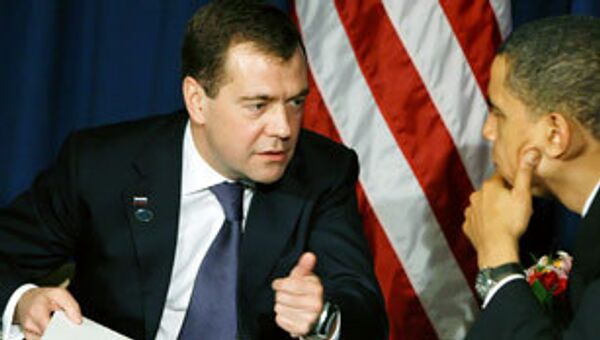The new Russian-U.S. arms reduction pact, to be signed on April 8 in Prague, will face problems on its way to ratification, Russian daily Kommersant said on Monday.
Russian President Dmitry Medvedev and U.S. President Barack Obama will sign the pact on Thursday in Prague to replace the START 1 treaty, which expired on December 5. The new treaty is broadly viewed as an important part of efforts by Medvedev and Obama to "reset" thorny relations between the two countries.
"Indeed, we would like the ratification [of the new pact] to be synchronized. But we should also take into account the traditional difference in the political calendars of Russian and U.S. lawmakers. So there may not be a complete synchronization," Kommersant quoted Medvedev's chief foreign policy aide Sergei Prikhodko as saying.
Kommersant said since Medvedev has personally taken part in drafting the long-awaited treaty, the ratification in the Russian parliament controlled by the pro-Kremlin party, does not give any reasons for concern.
But the U.S. Senate is likely to create several impediments for the ratification, Russian experts said. A total of 67 votes are needed to ratify the arms pact in the 100-seat Senate, and Obama will need the support of at least eight Republicans to push the bill through.
"Under the circumstances, it would be hard to get eight extra votes at once," Sergei Rogov, the head of Russia's main foreign policy think tank, the U.S. and Canada Institute, told Kommersant.
The additional risk factor for the new pact is the upcoming mid-term Congressional elections in November in which the Republicans may grab extra seats from the Democrats. They say Obama may have to look for an extra 15-20 votes if the ratification was held after the polls.
The second obstacle for the treaty is senators' personal interests in hindering the pact. Many of their voters are involved in producing or operating arms threatened by the treaty and backing the arms cuts pact could hit the senators' popularity.
In a sign of the looming problem, a group of U.S. military sector experts sent a letter of protest to the White House last year. Anti-START groups were founded by senators from states producing strategic bombers and submarines.
"President Obama demonstrated good fighting skills while passing his healthcare reform bill through Congress. We assume he will be as persistent in pushing through the START treaty," Kommersant quoted a Russian Presidential administration official as saying.
MOSCOW, April 5 (RIA Novosti)




